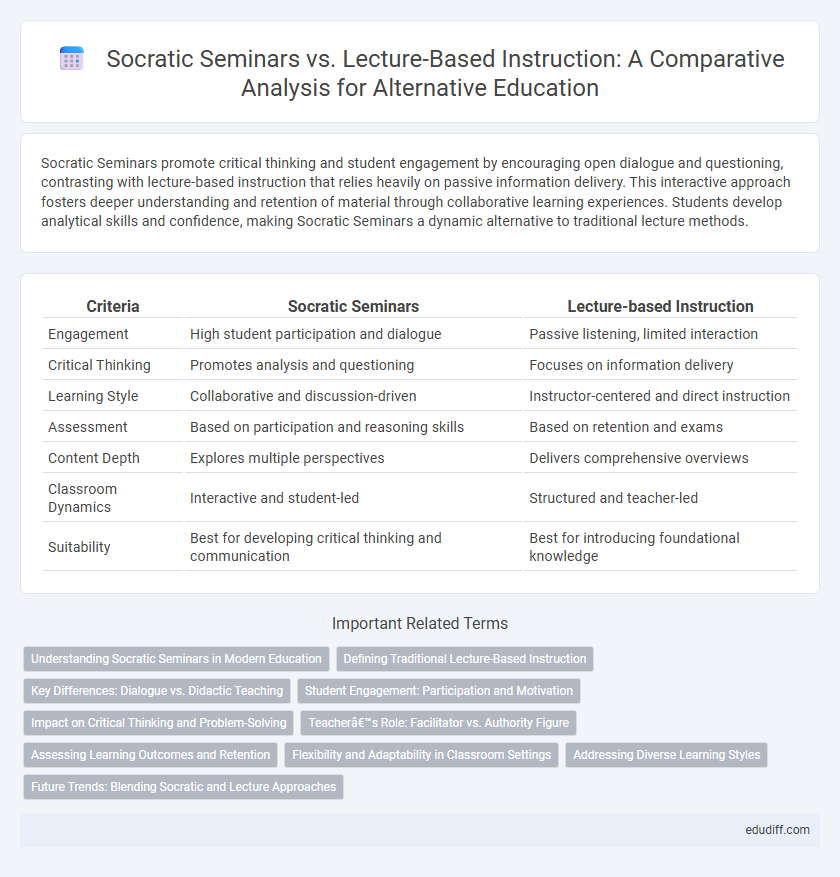Socratic Seminars promote critical thinking and student engagement by encouraging open dialogue and questioning, contrasting with lecture-based instruction that relies heavily on passive information delivery. This interactive approach fosters deeper understanding and retention of material through collaborative learning experiences. Students develop analytical skills and confidence, making Socratic Seminars a dynamic alternative to traditional lecture methods.
Table of Comparison
| Criteria | Socratic Seminars | Lecture-based Instruction |
|---|---|---|
| Engagement | High student participation and dialogue | Passive listening, limited interaction |
| Critical Thinking | Promotes analysis and questioning | Focuses on information delivery |
| Learning Style | Collaborative and discussion-driven | Instructor-centered and direct instruction |
| Assessment | Based on participation and reasoning skills | Based on retention and exams |
| Content Depth | Explores multiple perspectives | Delivers comprehensive overviews |
| Classroom Dynamics | Interactive and student-led | Structured and teacher-led |
| Suitability | Best for developing critical thinking and communication | Best for introducing foundational knowledge |
Understanding Socratic Seminars in Modern Education
Socratic seminars foster critical thinking and deep comprehension by engaging students in dialogue centered on open-ended questions, contrasting with the passive absorption often associated with lecture-based instruction. This method promotes active learning, where students collaboratively analyze texts and articulate their interpretations, enhancing retention and intellectual curiosity. Incorporating Socratic seminars in modern education supports the development of communication skills and reflective thinking, essential competencies in 21st-century learning environments.
Defining Traditional Lecture-Based Instruction
Traditional lecture-based instruction centers on a teacher delivering content directly to students in a unidirectional format, emphasizing passive learning and note-taking. This method relies heavily on memorization and structured presentation of factual information, often limiting student interaction and critical thinking. It contrasts with Socratic seminars by prioritizing content transmission over dialogue and inquiry-based exploration.
Key Differences: Dialogue vs. Didactic Teaching
Socratic Seminars emphasize interactive dialogue, encouraging critical thinking and deep understanding through student-led discussions that explore open-ended questions. In contrast, lecture-based instruction relies on didactic teaching, where the instructor delivers content in a one-way transmission focused on information dissemination. The key difference lies in the dynamic exchange of ideas in Socratic Seminars versus the passive reception of knowledge in lecture settings.
Student Engagement: Participation and Motivation
Socratic Seminars significantly boost student engagement by fostering active participation and critical thinking through open-ended dialogue, contrasting sharply with the passive reception typical of lecture-based instruction. This interactive approach enhances motivation by encouraging learners to construct knowledge collaboratively, promoting deeper understanding and sustained interest. Research indicates that classrooms embracing Socratic methods exhibit higher levels of student involvement and intrinsic motivation compared to traditional lectures.
Impact on Critical Thinking and Problem-Solving
Socratic seminars significantly enhance critical thinking and problem-solving by fostering dialogue and encouraging students to analyze complex ideas through questioning and reflection. In contrast, lecture-based instruction often limits engagement and reduces opportunities for students to practice evaluative reasoning and collaborative problem-solving skills. Research indicates that active participation in Socratic seminars develops deeper cognitive abilities and promotes sustained intellectual curiosity compared to passive information absorption in lectures.
Teacher’s Role: Facilitator vs. Authority Figure
In Socratic Seminars, the teacher acts as a facilitator, guiding students through open-ended questions that promote critical thinking and dialogue. This contrasts with lecture-based instruction, where the teacher assumes the role of an authority figure, delivering content in a one-way communication format. The facilitator approach encourages student engagement and collaborative learning, while the authority model emphasizes knowledge transmission and structured content delivery.
Assessing Learning Outcomes and Retention
Socratic Seminars promote critical thinking and deep comprehension by actively engaging students in dialogue, resulting in improved long-term retention compared to lecture-based instruction. Research indicates students participating in Socratic Seminars demonstrate higher analytical skills and better application of concepts on assessments. Lecture-based instruction often leads to passive learning and lower retention rates, as information delivery lacks the interactive reinforcement found in seminar-based methods.
Flexibility and Adaptability in Classroom Settings
Socratic Seminars foster flexibility and adaptability by encouraging open dialogue and critical thinking, allowing educators to tailor discussions based on student responses and interests. Lecture-based instruction offers less adaptability, as it relies on a structured delivery that limits interactive engagement and responsiveness to real-time student needs. Emphasizing flexible pedagogical approaches enhances student participation and promotes deeper understanding in diverse classroom environments.
Addressing Diverse Learning Styles
Socratic Seminars engage diverse learning styles by promoting critical thinking, active dialogue, and collaborative exploration, which benefit auditory and interpersonal learners. Lecture-based instruction primarily caters to auditory and visual learners through structured presentations but may limit interactive and kinesthetic learning opportunities. Integrating Socratic methods within lectures can enhance inclusivity and address multiple learner preferences effectively.
Future Trends: Blending Socratic and Lecture Approaches
Future educational trends emphasize integrating Socratic Seminars with lecture-based instruction to foster critical thinking while maintaining content delivery efficiency. Hybrid models incorporate interactive questioning within structured lectures, promoting deeper engagement and comprehension in diverse learning environments. Technology-enabled platforms support this blend by facilitating real-time dialogue and access to curated lecture materials, enhancing adaptability and student-centered learning.
Socratic Seminars vs Lecture-based Instruction Infographic

 edudiff.com
edudiff.com